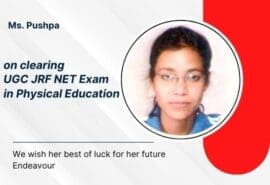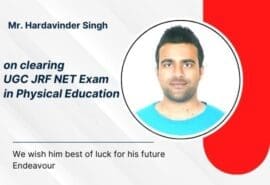
Which Unit is Most Important in CSIR NET Life Science?
Which Unit is Most Important in CSIR NET Life Science?
The CSIR UGC NET exam conducted jointly by the NTA and CSIR to determine eligibility for JRF and Lectureship is one of India's toughest postgraduate level tests. With intense competition and challenging paper patterns, taking coaching is often the easiest path to crack this exam.
However, joining classroom coaching brings considerable costs. So, can one clear CSIR NET without taking any coaching? Definitely yes! By following structured preparation strategies, cracking NET on your merit is achievable.
For NET Life Science Coaching, contact us at Mantram Study Group, SCO No. 80-81, First Floor, Sector 15-D, Chandigarh (Near Gate No. 2, Panjab University Chandigarh – Contact – 9779797575/ 9463049859)
Let's discuss actionable hacks to guide your self-study efforts smartly for CSIR NET success:
Hack 1: Analyze the Exam Pattern Thoroughly
Start by thoroughly understanding the syllabus division across sections, type, difficulty level of questions, paper structure, duration, negative marking, etc. This sets the foundation for designing preparation plans accordingly.
Hack 2: Create Section-wise Study Plans
Dividing the entire syllabus into portions and assigning realistic timelines for completion subject-wise is key. Give more time to advanced subjects over fundamental topics. Prepare schedules mapping daily study hours.
Hack 3: Refer to Standard Books and Material
Rather than randomly selecting guidebooks, read reviews online to finalize authors and publications preferred by NET toppers like CSIR guides, UGC modules, etc. The simplest concepts also become tricky without reliable content.
Hack 4: Extensive Question Paper Practice
Nothing can equal rigorously solving at least the last 10 years papers. It acquaints you with frequently asked topics, exactly how questions are framed and helps improve speed and accuracy under exam conditions. Create subject-wise chapter notes analyzing question trends.
Hack 5: Focus Equally on Theory and Applied Aspects
While fundamentals form the base, questions testing application and analysis must also be practiced for problem-solving. Hence, it is important to study real-life case studies, data interpretations, charts analysis, etc.
Hack 6: Practice Previous Cutoff Analysis
Check previous cutoffs across subjects to set realistic score targets. Analyze sectional qualifying marks trends and fluctuations in Part C advanced paper scores over the years. This clarifies how much you need to score to qualify for JRF or Lectureship.
Hack 7: Take Timed Mock Tests
Attempting mocks mimicking the 3-hour exam pattern is extremely important for assessing preparedness across easy, moderate, and difficult question types. Checking where you falter boosts confidence for the final test.
Additional Tips:
- Study with diligence and avoid distractions during preparation months
- Begin revision very early to recall better
- Take notes for quick reference
- Stay confident by being well-prepared
To summarize, structured planning, referring to quality prep material, question paper practice, analyzing previous scores, and taking mocks comprehensively cover all aspects needed to crack CSIR NET without relying on classroom coaching.
While coaching offers certain benefits, choosing self-discipline and consistently studying smartly from the right sources for 4-6 months dedicatedly can help clear this test with flying colors solely on your mettle!
Stay strategically focused, and success will be yours. Consistent effort in the right direction conquers all barriers. You can crack the CSIR NET obstacle by relying on self-study, provided your systematic planning and preparation efforts are sincere.
Thanks for visiting our website Mantram Study Group
CHECK OUR OTHER LINKS: -
Testimonials
FAQ
Q. What is the minimum percentile for CSIR NET Life Science?
For the CSIR NET Life Science exam, the concept of a minimum percentile does not directly apply in the same way it does for exams that rank candidates based on their percentile scores. Instead, CSIR NET sets minimum qualifying marks.
For candidates appearing in the General, EWS (Economically Weaker Section), and OBC (Other Backward Classes) categories, the minimum qualifying marks are 33%.
For candidates from SC (Scheduled Caste), ST (Scheduled Tribe), and PwD (Persons with Disability) categories, the minimum required is 25%. These criteria ensure that candidates secure basic marks to qualify for the examination, focusing on absolute marks rather than a percentile ranking system.
Q. What are the qualifying marks for CSIR NET 2024?
The qualifying criteria for the CSIR NET 2024 examination remain consistent with the information provided above. Candidates from the General, EWS, and OBC categories must score at least 33% marks, while those from the SC, ST, and PwD categories must score at least 25% to qualify.
In the Life Science subject and others, the raw marks obtained by candidates are normalized into an NTA (National Testing Agency) score or percentile. The results are then declared based on these percentile cut-offs, which helps standardize scores across different test sessions and ensures fairness in the assessment process.
Q. Which is better, JRF or Assistant Professor?
Choosing between JRF (Junior Research Fellowship) and the position of Assistant Professor depends on one's career aspirations, interests, and the stage of their professional journey.
Junior Research Fellowship (JRF): JRF is aimed at those pursuing research. It provides a stipend for candidates to conduct research in their chosen field of study and often serves as a gateway to pursuing a Ph.D. It is ideal for individuals deeply interested in research, innovation, and contributing to advancing science and knowledge.
Assistant Professor: This role is more inclined towards academics, involving teaching, mentoring students, and contributing to the educational offerings of an institution. Assistant Professors also engage in research, but their primary responsibilities include curriculum development, teaching, and guiding students. This position suits those passionate about education, teaching, and research within an academic setting.
Ultimately, the choice between JRF and Assistant Professor depends on personal career goals. If you are keen on a career deeply rooted in research to contribute new knowledge to your field, JRF could be the better choice.
If you wish to balance research with teaching and shaping the next generation of students, aiming for an Assistant Professor position might be more appropriate. Both roles are crucial in their rights and offer valuable contributions to the academic and research landscapes.













































